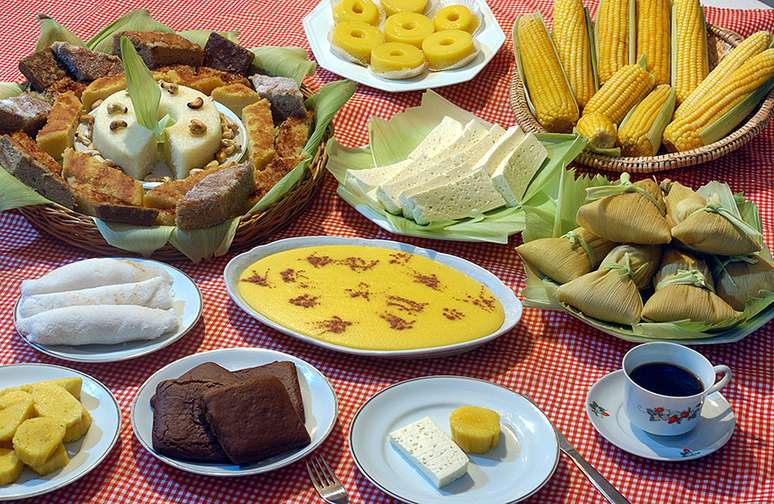Moderation is the watchword for those who want to experience the most delicious party of the year and taste the typical dishes
html[data-range=”xlarge”] figure image img.img-bcd53ca0b3f09e81cba227b588da7152q2abh221 { width: 774px; height: 504px; }HTML[data-range=”large”] figure image img.img-bcd53ca0b3f09e81cba227b588da7152q2abh221 { width: 548px; height: 357px; }HTML[data-range=”small”] figure image img.img-bcd53ca0b3f09e81cba227b588da7152q2abh221, html[data-range=”medium”] figure image img.img-bcd53ca0b3f09e81cba227b588da7152q2abh221 { width: 564px; height: 367px; }
There is nothing like enjoying a traditional June/July fiesta and having fun, dancing, socializing and, above all, eating, after all, the typical dishes are the main attractions of this event: couscous, pamonha, curau, hominy, cooked corn, paçoca, pé kid, cocada, apple of love, mulled wine, hot, finally, the list of delicacies that make up the festive menu is endless. However, when you eat, it’s important to be careful of excesses so as not to put your diet and health at risk.
“Pé de moleque, rice pudding, pamonha, curau, hominy, among others, are high-calorie foods. Pé de moleque, for example, has 503 calories per 100 grams», explains the nutritionist. Marcella Garcezdirector and professor at the Brazilian Association of Nutrology (ABRAN).
But it’s not just the amount of calories that counts: “The sweet offerings of typical dishes are usually loaded with sugar, which also increases the calorie load and the glycemic index of the recipes without adding important nutrients. Already savory options can contain, in addition to flour, excess fat. Not to mention ultra-processed foods, such as the popular sausage, which if consumed in excess can harm your health and favor the onset of metabolic, inflammatory and even neoplastic diseases”, warns the doctor.
Is it to avoid all delicacies?
That doesn’t mean, however, that you shouldn’t consume Julian dishes, since, in addition to being delicious, they have some benefits.
“Some of the ingredients used in the preparation of these recipes are very nutritious. Corn, for example, is rich in carotenoids, polyphenols, magnesium, potassium, iron, copper and vitamin A and B complexes, as well as fibre. Peanuts, on the other hand, are a leguminous source of folate, magnesium, zinc, phosphorus, potassium and vitamin E and B complexes”, underlines the nutrologist.
Therefore, the secret to not overloading the body lies in moderation and in the intelligent choice of the foods you will consume.
“It is possible to choose or prepare sugar-free versions, particularly important for people who have consumption restrictions, as well as including functional ingredients, such as wholemeal flour and bran, in the recipes. For example, hominy, which prepared with sugar and condensed milk has 350 kcal/100 g, can have the caloric load reduced to about 230 kcal/100 g if these ingredients are not added.
Beware of fats
Pay attention also to fats, which are typically more caloric: in the case of pé de moleque, made with peanuts (source of lipids), every 100 g can contain 503 kcal, which – just to give an example – would be equivalent, in calories, to a complete meal in a plate of rice (100g), beans (100g) and grilled chicken fillet (200g).
In addition to food, Marcella Garcez also cautions against the consumption of alcoholic beverages, such as mulled wine and mulled wine, which tends to be higher during this holiday season.
“Alcohol intoxication can impair liver and pancreatic functions and the cardiovascular and immune systems. In addition, alcohol is a central nervous system depressant and can negatively affect mental health,” the doctor points out, who reiterates that there is no safe amount for alcohol consumption.
“Alcoholic drinks should preferably not be ingested, but if consumed, always opt for very moderate drinks, especially hot drinks, which, in addition to alcohol, have a large amount of added sugar. Additionally, it is recommended that you consume plenty of water, preferably in the same amount as your alcoholic beverage, to help balance the body’s hydration and minimize the effects of alcohol.”
And it is useless to exaggerate with typical dishes and alcoholic drinks in the period of July with the premise of a detox diet afterwards.
“The concept of a ‘detox’ diet, in addition to being controversial, is not scientifically proven. So, it’s important to be careful, especially with extremely restrictive ‘detox’ diets, which can be unbalanced and not provide all the essential nutrients for the body. The ideal, after a period of food abuse, is to return to a balanced, varied and most natural eating habit, always accompanied by adequate hydration, moderate and regular physical activity, stress control and adequate sleep”, he concludes. Marcella Garcez.
HOMEWORK inspires transformation in the world of work, in business, in society. Created by Compasso, a content and connection agency.
Source: Terra
Ben Stock is a lifestyle journalist and author at Gossipify. He writes about topics such as health, wellness, travel, food and home decor. He provides practical advice and inspiration to improve well-being, keeps readers up to date with latest lifestyle news and trends, known for his engaging writing style, in-depth analysis and unique perspectives.









